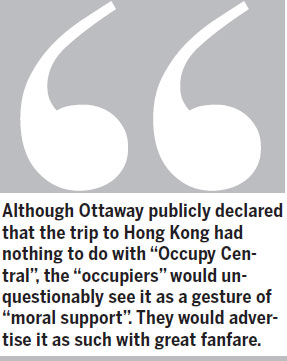Denying UK delegation entry into HK justified
Updated: 2014-12-04 07:49
By Yan Ming(HK Edition)
|
|||||||||
T he United Kingdom Parliament Foreign Affairs Select Committee is conducting a review of the implementation of the Sino-British Joint Declaration on the issue of Hong Kong. The agreement was signed by the British and Chinese governments on Dec 19, 1984. As part of the inquiry the committee decided to send a delegation to Hong Kong. This was to be headed by its chairman Richard Ottaway, to "investigate" but the Chinese embassy in London informed the members of the planned delegation that if they attempted to travel to Hong Kong for their intended purpose, they would be refused entry.
This committee, as expected, made a big deal of China's snub, with Ottaway openly questioning whether or not Beijing had the authority to determine who may be granted entry into Hong Kong. Prime Minister David Cameron's office also became involved, suggesting that the Chinese government's decision risked attracting more concern over its handling of Hong Kong governance.
As unsurprising as these reactions are, UK arguments are likely to deceive the unwitting observer into thinking that the Chinese government does not have the authority to reject the UK lawmakers' visa applications to enter Hong Kong.
Detractors of the Chinese government in this case, particularly UK politicians and their supporters, seem to believe the Ministry of Foreign Affairs has overstepped its constitutional authority by becoming involved in the granting of British politicians' visas - ordinarily the responsibility of the Hong Kong SAR Immigration Department.
However it is absolutely clear: According to the Basic Law of the Hong Kong SAR as well as the nation's Constitution, the HKSAR is directly under the jurisdiction of the central government, which handles all defense and foreign affairs related to Hong Kong.
As such the suggestion that the Foreign Ministry does not have the constitutional authority to reject UK politicians' applications for visas to enter Hong Kong may be right if a UK politician's stay in Hong Kong is not in any official capacity - as members of the Foreign Affairs Committee of the House of Commons - or any bilateral agreement between the two national governments concerned.
It is common knowledge that what these British politicians intended to do in Hong Kong was part of their committee's ongoing inquiry into the implementation of the joint declaration in Hong Kong. Hence the Hong Kong trip is without question intended to carry out the official business of the UK government. It is entirely concerned with a bilateral agreement and nothing else. Besides, have they forgotten the name of their committee? How can any of them question the authority of the Ministry of Foreign Affairs to grant or withhold visas to members of a delegation representing the UK Parliament to enter the HKSAR over matters concerning a bilateral agreement?
Are they suggesting the proposed Hong Kong visit had nothing to do with foreign affairs from a British point of view? If the answer is yes, then who was it that actually overstepped their constitutional authority?
As soon as the aforementioned committee announced its inquiry into implementation of the Sino-British Joint Declaration in September many Hong Kong people suspected the real intention was to boost the sagging morale of the illegal "Occupy Central" campaign - for good reason I believe.
Such suspicions are to be expected after so many Western politicians and commentators voiced their unequivocal support for the unlawful and abusive behavior of the "occupiers" in Hong Kong, most notably Chris Patten, the last governor of Hong Kong and a member of the House of Lords. Patten is on a personal crusade against the Chinese government over the fate of a "color revolution" which can be traced back to the "democratic reforms" he hastily started before the handover, in violation of the joint declaration.
Although Ottaway publicly declared that the trip to Hong Kong had nothing to do with "Occupy Central", the "occupiers" would unquestionably see it as a gesture of "moral support". They would advertise it as such with great fanfare.
As for the "risk" of evoking more concerns over Beijing's handling of Hong Kong affairs by refusing visa applications by the UK parliamentary select committee members, would it help ease such concerns if the Chinese government were to reverse its decision in this case? I don't think so.
After all, this is a matter for the Chinese government demonstrating its sovereign rule over Hong Kong according to the nation's Constitution, which is the basis of Hong Kong's Basic Law. Unless one can prove that implementation of the Sino-British Joint Declaration is none of Beijing's business, there are no grounds for a UK parliamentary committee to question the constitutional authority of the Chinese government in denying its delegation entry to Hong Kong.
The author is a veteran current affairs commentator.

(HK Edition 12/04/2014 page1)